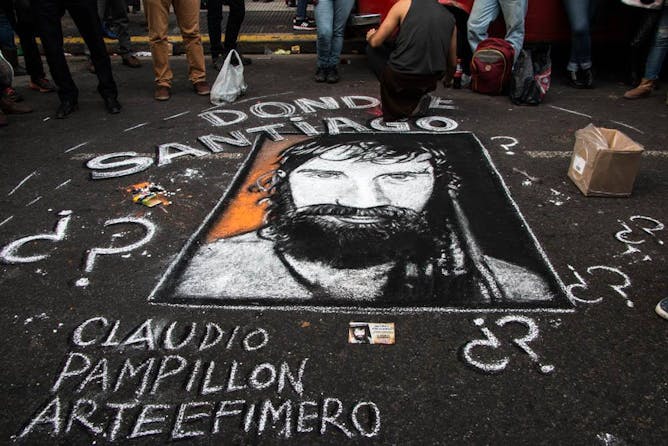|
Santiago Maldonado’s body was found in a river in Patagonia this month, 81 days after he went missing. He was last seen alive at a protest for the land rights of the Mapuche, a group of indigenous peoples from Chile and Argentina. Nick Clare, Liz Mason-Deese and Victoria Habermehl explain that the raid during which Maldonado disappeared was one of many organised against Mapuche communities in southern Argentina – and yet another flashpoint in a long struggle for indigenous rights.
As many around the globe prepare to celebrate that creepiest of all holidays, Halloween, Arash Javanbakht and Linda Saab explore how our brains drive our deep-rooted desire for fright and why some people crave fear more than others.
|

Still searching for answers.
Moni Soria via Wikimedia Commons
Nick Clare, University of Nottingham; Liz Mason-Deese, George Mason University; Victoria Habermehl, University of Sheffield
The disappearance of Santiago Maldonado in Argentine Patagonia is part of the global conflict between the forces of capital and indigenous rights.
|

Scary pumpkins are the least of what frightens us at Halloween, a day devoted to being frightened.
asife/Shutterstock.com
Arash Javanbakht, Wayne State University; Linda Saab, Wayne State University
We may pretend that we do not like fear, but Halloween proves otherwise. Many of us enjoy being scared. But why?
|
Politics + Society
|
-
Hans Hendrischke, University of Sydney
China's newly elected leadership team promises to bring continuity in the country's gradual domestic reform and a stronger focus on internationalism.
-
Andrew Faull, University of Cape Town
While many South African police officers, who were born into poverty, grew to appreciate the job, they want more for their children - careers requiring degrees - and work to provide them.
-
Georgina Blakeley, The Open University
Move by the senate in Madrid came just after the Catalan parliament voted for independence.
|
|
Science + Technology
|
-
Virginia Barbour, Queensland University of Technology
Could the real open access please stand up? If more research was published according to true open access principles, we'd see better application of evidence for everyone's benefit.
-
Fiann Smithwick, University of Bristol
Reconstructing the colours of the feathered Sinosauropteryx gives hints about its habitat and lifestyle.
|
|
Arts + Culture
|
-
Gwen Ansell, University of Pretoria
South African trumpeter Hugh Masekela has made an impact across the world during his decades-long musical career – not enough attention has been paid to his innovative imagination though.
-
Sam George, University of Hertfordshire
How the vampire transitioned from folkloric peasant to Byronic Lord.
|
|